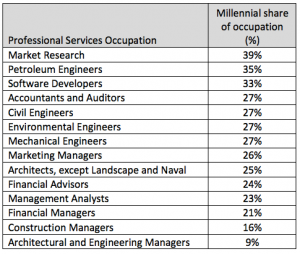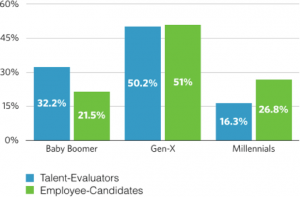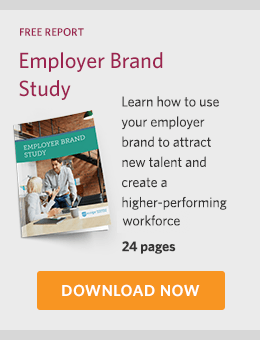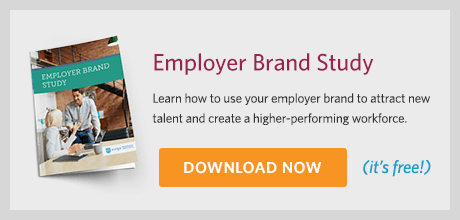In our most recent Employer Brand Study, we sought to understand how a strong employer brand could help attract talented professionals — a challenge facing many firms today.
What is an employer brand?
A firm’s employer brand is simply a firm’s reputation as a place to work. It can have general elements (for example, “a great place to work”) and very specific attributes (“an entrepreneurial culture” or “the most family-friendly benefits in the state.”)
An employer brand should emphasize a firm’s strong attributes and provide a window into an organization. It should show candidates what it would be like to be part of the firm culture.
Download The Employer Brand Study
Just like a client-facing brand, an employer brand performs many of the same functions, like differentiating a career at your firm from a career with a competitor.
Firms that focus on strengthening their employer brand are able to position them- selves not only to attract talented professionals, but also to attract a very important audience: the future leaders of their firm.
That’s where Millennials come into the picture. An excellent Tableau data visualization from Emsi uses Pew Research Center labor statistics to analyze various occupations by generation.
According to this data, Millennials make up roughly 25% of the professional services work force. The Millennial shares of the top occupations in professional services are shown in the table below.

The sample in our study was very similar. Nearly 27% of employee-candidates studied were Millennials.

Where to reach Millennials
 We asked candidates where they would search for career opportunities if they were looking today. Nearly 90% of Millennials indicated they would search on LinkedIn, highlighting the importance of a firm’s visibility on this particular social channel.
We asked candidates where they would search for career opportunities if they were looking today. Nearly 90% of Millennials indicated they would search on LinkedIn, highlighting the importance of a firm’s visibility on this particular social channel.
More than 70% would visit a firm’s website directly — a practice used more by Millennials than older generations. These young professionals were also more likely to use job-listing websites like Monster, Indeed and CareerBuilder.
What criteria Millennials use to evaluate opportunities
When Millennials are looking for a career opportunity in professional services, the top criteria they use to evaluate firms fits the mold of older generations.
85% would evaluate firms based on their culture, work-life balance, and salary. 70% would evaluate firms based on their reputation in the marketplace and office location/commute distance. These candidates are looking to answer questions like these:
- How do I fit into the firm’s culture?
- Will I have work-life balance and flexibility?
- How competitive is the salary?
- What is the firm’s reputation in the marketplace?
- Where is the office located?
[bctt tweet=”85% of Millennials evaluate firms based on their culture, work-life balance, and salary” username=”HingeMarketing”]
What Millennials really care about
Knowing what criteria these candidates use to evaluate employers is a good starting place. But how do they compare in terms of relative importance? To find out, we asked candidates to rate certain relevant scenarios to evaluating career opportunities.
What we found took us by surprise. Our data suggest that working with a growing firm and building a personal brand in their industry were more important to Millennials than earning a top salary.
Furthermore, having the option to work remotely or telecommute was just as important as a top salary.
While not as prominent as the scenarios mentioned above, making a socially meaningful contribution was also important to Millennials. This can be accomplished in many different ways. For example, Hinge recently volunteered at Cornerstones in Reston, a local shelter in our community providing those in need with food, shelter, affordable housing and childcare.
Just as organizations are looking for candidates that fit their organization, young professionals are looking for career opportunities that fit their particular situation.
Putting it all together
If you want to attract Millennial professionals, it is important to communicate your firm’s employer brand online. Posting job ads on LinkedIn and having a Careers page on your website are great places to start, they are only the tip of the iceberg.
A strong employer brand will offer a value proposition that resonates with your ideal candidate. It will address the criteria candidates use to evaluate career opportunities and it will reach these individuals in the right places.
The way you communicate your employer value proposition is also critical. According to LinkedIn, candidates are 3X more likely to trust company information from employees than from the CEO. In other words, your current employees are your most trusted employer brand ambassadors.
Download The Employer Brand Study
Communicating your employer value proposition through current employees can be done a number of ways. Below are a few examples:
- Employee reviews on websites like Glassdoor, Monster and Indeed
- Video or written employee testimonials on your website
- Pairing photographs of employees with block quotes on a particular aspect of firm culture
- Employee engagement on social media
If you invest in your employer brand architecture and strengthening it with the voice of your own employees, you will have an authentic, powerful message that can be used in job advertisements, content marketing, social media (particularly LinkedIn) and on your firm’s website.
To learn more about employer branding strategies, check out this post.
Additional Resources:
- Our Rebranding Guide gives you the tools and knowledge you need to lead your firm through a rebranding.
- Get strategies, tips, and tools for developing your firm’s brand with Hinge’s Brand Building Guide for Professional Services Firms.
- Join Hinge University and take the in-depth courses and read the step-by-step How-Tos to take your brand to a new level of sophistication and engagement.
How Hinge Can Help:
Hinge’s Branding Program equips your firm to stand out in a crowded marketplace and build a distinguished brand that drives sustained growth. From strategy to implementation, we take your firm through the rebranding process — painlessly and with exceptional results.

